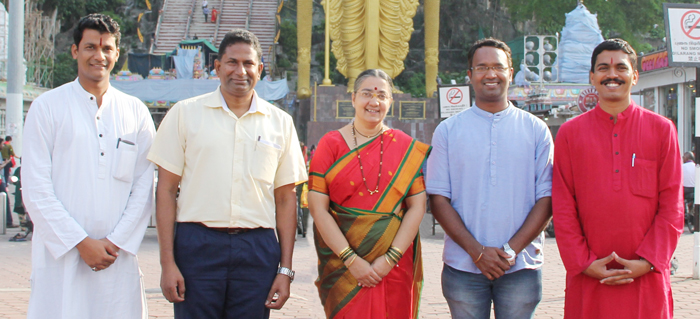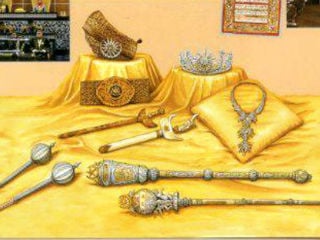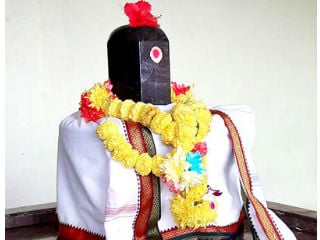Study tour of the Maharshi Adhyatma Vishwavidyalay troupe to
South-East Asian countries under the guidance of Sadguru (Mrs.) Anjali Gadgil
The ancient Malay Dweep is today’s Malaysia. Malay Dweep is a congregation of many islands. Later it came to be known as Melaka. Many Sanskrut words are used in the Malay language. A reference to the Ramayan and Mahabharat also exists in Malay literature. Till the 15th century, that is till Islam came to Malaysia, the Hindu emperors Majapahit, Ayudhya and Shrivijay ruled for 1500 years. No history of Malaysia before 2000 years is available.

1. King Of Malaysia Yang di-Pertuan Agong
It means the one who is being crowned the king. He is the king and national head of Malaysia. After liberation from the British in 1957 the office of the ‘Federation of Malay’ (now Malaysia) was established. As Malaysia has constitutional royalty the king from there becomes the head of the nation. Yang di-Pertuan Agong is of the kings elected to power. Shrivijay and Ayudhya ruled in the 7th century. The concept of electing a king started then. Those days the king would be selected by representatives from different states. The queen is called Raja Permaisuri Agong.
2. Due to Indianisation of South-East Asian countries
the economic norms of Bharat had an impact on the economy
of residents of Malay, Thailand, Phillipines and Indonesia
If observed from the historical viewpoint, ancient Bharatiya culture influences South-east Asia. Hence several dominions like Thailand, Indonesia, Malaysia, Singapore, Phillipines, Cambodia and Vietnam became prosperous. The influence of Bharatiya culture on these regions is referred to as Indianisation.
The French archaeologist George Kodes has described Indianisation as the spread and extent of the Bharatiya political system, Hindu Dharma, Buddhist religion and Sanskrut in South-East Asia. Original Bharatiyas, but old and present non-resident Bharatiya society has always played an important role here as professionals, businessmen, priests and warriors and Bharatiya economy has clearly shown its influence on the economy of Malay, Thailand, Phillipines and Indonesia.
3. Influence of Sanskrut language on Malay language
In Malay, the state head is called ‘Duli Yang Maha Muliy Seri Paduka Baginda Yang Di-pertuan Agong’ out of which ‘Yang Di-Pertuan Agong’ means the king of Malaysia. ‘Duli Yang Maha Muliy Seri Paduka Baginda Yang Di-pertuan Agong’ means ‘I am the dust at the Holy wooden footwear (paduka) of my king who is my great master’.
In Ramayan, Bharat had placed the Holy wooden footwear of Shriram on the throne and looked after the kingdom till He returned from the forest after exile. This incident from the Ramayan is associated with the above lines in Malay language.
3 A. Words derived from Sanskrut
| Words derived from Sanskrut | Meaning |
| 1. Duli | Dhul – dust |
| 2. Maha | Mahan – great |
| 3. Mulya | Mulya – value |
| 4. Stri | Shri (A respectful prefix added before the name of a person, God or a religious scripture) |
| 5. Paduka | Paduka (the sacred footwear used by the saints in Hindu Religion or by the Jain Saints) |
| 6. Baginda | Raja (Maharaj), King |
| 7. Pertuan | Swami (Master) |
| 8. Agong | Sarvochch (ultimate) |
3 B. Parameshwar
One of the Malaysian kings was named Parameshwar. In a Portuguese book ‘Suma Oriental’ Parameshwar has been referred to as Paramisura or Parimisura. The root Sanskrut word is Parameshwar. In Tamil and other South Indian languages Bhagwan Shiva is called Parameshwar. In Hindu Dharma however Parameshwar is the ‘Supreme Deity’. In Tamil language, one of the Names of Bhagwan Shiva, is Parameshwar.
3 C. The name Melaka is derived from the Sanskrut word amalaka (the gooseberry tree)
It is believed that the amalaka (amla) tree was created first during origin of the universe. As it is a belief that this tree is associated with wealth, health and energy, Hindu traders visiting this place have named it amalaka. Later the word got perverted and became ‘melaka’.
– Mr. Puglendi Senthiyappan, Malaysia (15.4.2018)

 The world famous temple of Bhagwan Kartikeya in Batu caves, Malaysia
The world famous temple of Bhagwan Kartikeya in Batu caves, Malaysia Influence of Bharatiya (Hindu) culture on Malaysian rulers
Influence of Bharatiya (Hindu) culture on Malaysian rulers Mausoleums of three Saints in Malaysia
Mausoleums of three Saints in Malaysia